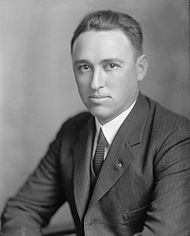
38th Governor of Tennessee
Gordon Weaver Browning (November 22, 1889 – May 23, 1976) was an American politician who served as Governor of Tennessee from 1937 to 1939, and again from 1949 to 1953. He also served six terms in the U.S. House of Representatives, from 1923 to 1935, and was Chancellor of Tennessee's Eighth Chancery District in the 1940's. As governor, he stabilized state finances, doubled the state's mileage of paved roads, and enacted legislation to curb voter fraud. His victory in the hard-fought 1948 gubernatorial campaign helped break the power of Memphis political boss E. H. Crump.
In the years following World War II, Browning served in the Allied occupational government in Germany, and was a civil affairs advisor on the staff of General Dwight D. Eisenhower.
Early Life:
Browning was born near Atwood in Carroll County, Tennessee, the son of James and Melissa (Brock) Browning. When he was still young, his parents moved to Milan, Tennessee, where his father served as a justice of the peace. After graduating from Milan High School in 1908, Browning enrolled in Valparaiso University in Indiana, where he earned tuition money waiting tables. He graduated with a Bachelor of Science and a Bachelor of Pedagogy in 1913.

Browning taught school briefly before enrolling in the Cumberland School of Law in Lebanon, Tennessee. He graduated in 1915, and was admitted to the bar shortly afterward. In March 1915, he began practicing in the law office of George McCall in Huntingdon, Tennessee, in his native Carroll County.
In June 1917, after the U.S. entry into World War I, Browning enlisted in the Tennessee National Guard as a 2nd lieutenant in Company D of the First Tennessee Field Artillery. This unit was activated as the 114th Field Artillery of the 30th Infantry Division, under the command of General Lawrence Tyson. Browning was promoted to captain, and transferred to Company A. He fought with the unit in northern France, and was cited for gallantry.
After being discharged in 1919, Browning resumed practice of law in Huntingdon. In 1920, he ran for the 8th district seat in the U.S. House of Representatives, but lost to his former law school classmate, Lon Scott, by a 50% to 49% margin. He ran again in 1922, and was victorious. He represented this district for five consecutive terms (frequently running unopposed), and represented the 7th district for one term (1933–1935) following redistricting. During his final term in the House, Browning was one of the "managers" (prosecutors) in the impeachment hearings of California judge Harold Louderback.
In 1934, Browning sought the Democratic Party nomination for the U.S. Senate seat that had been vacated when Cordell Hull resigned to become Secretary of State. His chief opponent was Nathan L. Bachman, who had been temporarily appointed to the seat. Bachman had the support of Memphis political boss E. H. Crump, who was at the height of his power after the downfall of his rival, Luke Lea, and Browning struggled with voters in East Tennessee. He was defeated by Bachman, 166,293 votes to 121,169.
Later Life:
Following his defeat in 1952, Browning returned to Huntingdon to practice law. He again challenged Clement for the party's nomination for governor in 1954, but was defeated by a large margin. He remained active in the Democratic Party, however, traveling frequently to attend party functions. He also operated a dairy farm and an insurance firm. He died on May 23, 1976, and was buried in Huntingdon's Oak Hill Cemetery.
Family And Legacy:
Browning married Ida Leach in 1920. They had no children.
The Gordon Browning Museum in McKenzie, Tennessee (in Carroll County) preserves documents and artifacts related Browning's life and career. The museum is located in the old McKenzie post office building.
Dormitories on the campuses of Tennessee Technological University and the University of Tennessee at Martin have been named in honor of Browning.
External Links:
- Gordon Browning Museum
- Governor Gordon Browning Papers - 1st term (finding aid) – Tennessee State Library and Archives
- Governor Gordon Browning Papers - 2nd term (finding aid) – Tennessee State Library and Archives
- Gordon Browning – entry at the National Governors Association